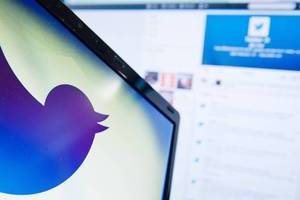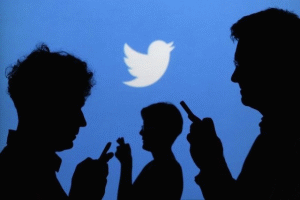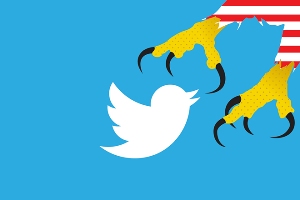British hacker linked to attack on Pentagon Twitter feed
 The "CyberCaliphate" hacking group that attacked a Twitter account belonging to the Pentagon was founded by a Briton who was once jailed for hacking the personal address book of former British Prime Minister.
The "CyberCaliphate" hacking group that attacked a Twitter account belonging to the Pentagon was founded by a Briton who was once jailed for hacking the personal address book of former British Prime Minister.
U.S. and European government sources said investigators strongly believe that the hacker was the leader of CyberCaliphate, though they do not know if he was personally involved in hacking the Twitter and YouTube accounts of the U.S. Central Command, which oversees military operations in the Middle East. He could not be reached for comment. Pentagon spokesman has called the cyberattack "inconvenient".
Read moreCentral Command’s Twitter account hacked
 Twitter and YouTube accounts belonging to the military’s US Central Command were hacked. Hackers supportive of the terrorist group Islamic State, also known as ISIS, took credit and issued a warning to the US military.
Twitter and YouTube accounts belonging to the military’s US Central Command were hacked. Hackers supportive of the terrorist group Islamic State, also known as ISIS, took credit and issued a warning to the US military.
The hackers posted images of spreadsheets that purported to contain the home addresses and other contact information for retired US Army generals and other images purporting to be US military maps and plans. The Pentagon appeared to confirm the authenticity of the information, telling reporters that the exposed information was not classified and that the images came not from the government but from the Massachusetts Institute of Technology.
Read moreShould you let your kids on Facebook or Twitter?
 You can tell your kids to stay off the social networks and you can tell yourself that they’ll listen, but chances are they’ll find a way on, anyway. So we’re going to address reality and do our best to ensure that their Facebook and Twitter accounts are secure and private and that they use the networks as safely and responsibly as possible.
You can tell your kids to stay off the social networks and you can tell yourself that they’ll listen, but chances are they’ll find a way on, anyway. So we’re going to address reality and do our best to ensure that their Facebook and Twitter accounts are secure and private and that they use the networks as safely and responsibly as possible.
Of course, Twitter and Facebook are data brokers. This means they make money selling anything and everything you post there to third-party marketing and advertising firms. It’s also safe to assume they are tracking any web-browsing you do while logged in, but you can at least try to prevent this.
Read moreGoogle to revamp its products with 12-and-younger focus
 With Google processing 40,000 search queries a second — or 1.2 trillion a year — it's a safe bet that many of those doing the Googling are kids. Little surprise then that beginning next year the tech giant plans to create specific versions of its most popular products for those 12 and younger.
With Google processing 40,000 search queries a second — or 1.2 trillion a year — it's a safe bet that many of those doing the Googling are kids. Little surprise then that beginning next year the tech giant plans to create specific versions of its most popular products for those 12 and younger.
The most likely candidates are those that are already popular with a broad age group, such as search, YouTube and Chrome. Google would not offer a timetable for the rollout. Google wants to be thoughtful about what we do, giving parents the right tools to oversee their kids' use products. So the better approach is to simply see to it that the tech is used in a better way.
Read moreTwitter will start tracking users
 Twitter users will be alerted to a change in the type of data the social network is collecting on them, and will be offered the option to opt-out by adjusting their settings. The data in question is a list of the apps you have installed on your mobile device.
Twitter users will be alerted to a change in the type of data the social network is collecting on them, and will be offered the option to opt-out by adjusting their settings. The data in question is a list of the apps you have installed on your mobile device.
The company says it’s using the app data to help “build a more tailored experience for you on Twitter,” which includes things like improving your “who to follow” recommendations by connecting you with those who have similar interests; showing your relevant promoted content; and adding content to your timeline like tweets and accounts that Twitter thinks you’ll find interesting.
Read moreChechen leader (Russia) Ramzan Kadyrov offered Russia to be without foreign messengers
 Using Skype, Twitter and other western services harms the security of the country, says the head of Chechnya. Chechen leader Ramzan Kadyrov said that the spread of western communication services on the Internet harms national security.
Using Skype, Twitter and other western services harms the security of the country, says the head of Chechnya. Chechen leader Ramzan Kadyrov said that the spread of western communication services on the Internet harms national security.
Their use encourages the ongoing double standards west policy, Kadyrov said. He considers situation to be unacceptable in which the West controls Russian users, and Russia is far from the steering information. The main problem is lack of control. Kadyrov also offered to turn off the Internet, as a global network, in his opinion, interfere with the proper education of youth.
Read moreTwitter sues the government of the USA
 Twitter just sued the federal government over restrictions the government places on how much the company can disclose about surveillance requests it receives. For months, Twitter has tried to negotiate with the government to expand the kind of information that it and other companies are allowed to disclose. But it failed.
Twitter just sued the federal government over restrictions the government places on how much the company can disclose about surveillance requests it receives. For months, Twitter has tried to negotiate with the government to expand the kind of information that it and other companies are allowed to disclose. But it failed.
Twitter asserts in its suit that preventing the company from telling users how often the government submits national security requests for user data is a violation of the First Amendment. The move goes a step beyond a challenge filed by Google and other companies last year that also sought permission on First Amendment grounds to disclose how often it receives national security requests for data.
Read moreSocial Media and the ‘Spiral of Silence’
 A major insight into human behavior from pre-internet era studies of communication is the tendency of people not to speak up about policy issues in public—or among their family, friends, and work colleagues—when they believe their own point of view is not widely shared. This tendency is called the “spiral of silence”.
A major insight into human behavior from pre-internet era studies of communication is the tendency of people not to speak up about policy issues in public—or among their family, friends, and work colleagues—when they believe their own point of view is not widely shared. This tendency is called the “spiral of silence”.
Some social media creators and supporters have hoped that social media platforms like Facebook and Twitter might produce different enough discussion venues that those with minority views might feel freer to express their opinions, thus broadening public discourse and adding new perspectives to everyday discussion of political issues.
Read moreThink crypto hides you from spooks on Facebook? THINK AGAIN
 Activists just got another reason to worry about what spooks might be able to learn about them, with boffins demonstrating that a decent traffic fingerprint can tell an attacker what's going on, even if an app is defended by encryption.
Activists just got another reason to worry about what spooks might be able to learn about them, with boffins demonstrating that a decent traffic fingerprint can tell an attacker what's going on, even if an app is defended by encryption.
The researchers from the Universities of Padua and Rome have found that for activities like posting messages on a friend's Facebook wall, browsing a profile on a social network, or sending an e-mail, there's no need to decrypt an encrypted data flow. The researchers note that even in the hands of a knowledgeable user there are opportunities for “malicious adversaries willing to trace people … the adversary can still infer a significant amount of information from the properly encrypted traffic.”
Read moreTwitter: 23 million active users are actually bots
 A new SEC filing says more than 8% of the accounts on the social media site are automated. While these bots may provide some kind of public service information, they may also be created to drum up buzz about a company or artificially boost a user's number of followers.
A new SEC filing says more than 8% of the accounts on the social media site are automated. While these bots may provide some kind of public service information, they may also be created to drum up buzz about a company or artificially boost a user's number of followers.
The social network currently has 271 million active users but, according to a new filing with the Security and Exchange Commission, over 8% of them aren't operated by humans. One of Twitter's big selling points, whether it be to music fans, grass roots political activists, sports obsessives, movie buffs or journalists, is that it breaks down the barriers between you and the person or the subject that most interests or excites you.
Read moreAxarhöfði 14,
110 Reykjavik, Iceland















